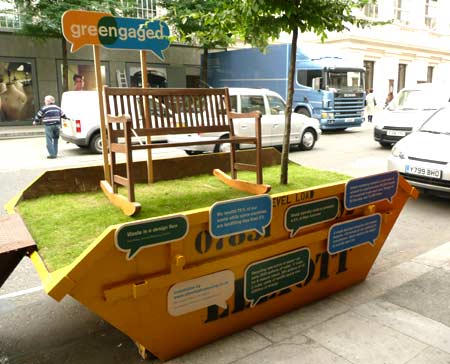
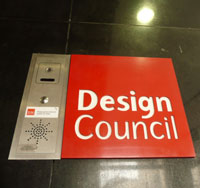 The London Design Festival always throws up some interesting events, especially involving clever people trying new things in design and sharing their experiences and expertise.
The London Design Festival always throws up some interesting events, especially involving clever people trying new things in design and sharing their experiences and expertise.
This year, the Design Council are running Greengaged, a “sustainability hub… developed and organised by [re]design, thomas.matthews and Kingston University with Arup and Three Trees Don’t Make A Forest”. It’s a series of talks and workshops about ecodesign and sustainable issues in design.
On Tuesday I went, along with Alex Plant, for the ‘Behaviour Change’ talks, part of the ‘Gauging the Green’ day, where Unchained‘s Lea Simpson, More Associates‘ Luke Nicholson, IDEO London‘s Andrea Koerselman and Fiona Bennie from Forum for the Future all talked about their work on using design to change behaviour.
[Apologies: YouTube have since removed the clip due to an infringement claim from Candid Camera, Inc. So here’s an alternative link – it may not last either, though, but if you search for “candid camera” elevator I’m sure you’ll be able to find it]
Lea Simpson started with this great Candid Camera clip from 196x demonstrating how easily social proof can be used to influence behaviour. Lea argued three important points relevant to behaviour change (many thanks to Christian McLening for taking better notes than I did):
1. Behaviour change requires behaviour (i.e. the behaviour of others: social effects are critical, as we respond to others’ behaviour which in turn affects our own; targeting the ‘right’ people allows behaviour to spread)
2. Behaviour and motivation are two different things: To change behaviour, you need to understand and work with people’s motivations – which may be very different for different people.
3. Desire is not enough: lots of people desire to behave differently, but it needs to be very easy for them to do it before it actually happens.
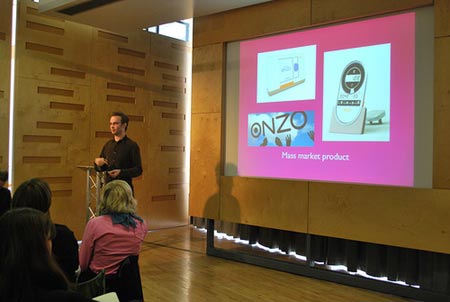
Luke Nicholson’s presentation: photo by the indefatigable Kate Andrews.
Luke Nicholson talked about More‘s work on enabling the public to understand energy use and carbon footprints via home monitoring systems – as he put it, there are “some invisible forces going round your home, and this is a lens onto them”. More’s ‘energy lens’ – which can be positioned on a window, hence linking energy consumption and climate/the weather in users’ minds, and making it as easy to check “what the energy’s like today” as “what the weather’s like today” – has recently been spun out as Onzo – who look to be employing a couple of very talented Brunel Design graduates.
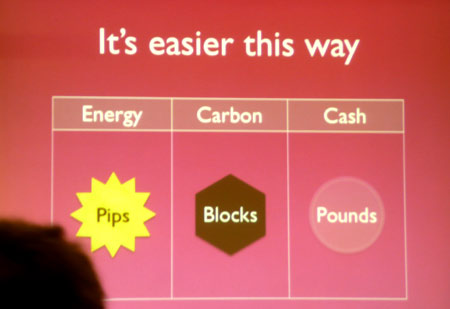
Luke also talked about More’s research with energy literacy – can we create a vernacular for better public understanding of energy, carbon, current, and so on? The above slide showed the idea of ‘pips’ and ‘blocks’ as some kind of accounting unit for energy and carbon, respectively, easily comparable to pounds (sterling) for cost; there was also an interesting series of diagrams using different shapes and sizes to explain simply, visually, the difference between high-current-drawing appliances and those which draw lower currents. Changing consumer demand for new products was also addressed with the idea of a ‘Kept’ sticker which could be affixed to products such as phones, to announce “I’m keeping this”.
A lot of this really does seem to be about framing – and joining up the agendas of different groups (consumers, the electricity industry, manufacturers, governments) to provide a new resultant pointing in the desired direction. As Luke said, “We’re playing into cultures that don’t exist yet.”
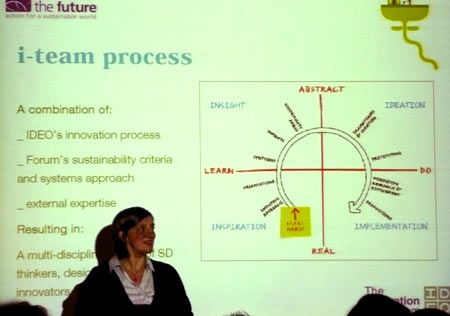
Andrea Koerselman and Fiona Bennie introduced their ‘i-team – local innovation on climate change’ project, a service design collaboration between IDEO and Forum for the Future, working with councils and local authorities to inspire behaviour change on issues such as driving to work, reducing electricity usage, and so on. This involves a lot of user observation – an IDEO speciality, of course – and an Inspiration-Insight-Ideation-Implementation process, as in the slide above. Talking to Fiona afterwards, she mentioned that it’s quite a novel experience for many councils to be involved in generating ideas without explicit returns-on-investment or outcomes defined, and so the ‘Ideation’ stage was going to be especially interesting.
Overall, this was a very interesting and worthwhile programme of talks – and this is just a snapshot of the many taking place this week and next in London. Tomorrow, I’m off to some of System Reload’s workshops, and on Monday, back at the Design Council, Tracy Bhamra and Emma Dewberry, among others, will be talking about sustainable design education. I’ll let you know how it all goes.